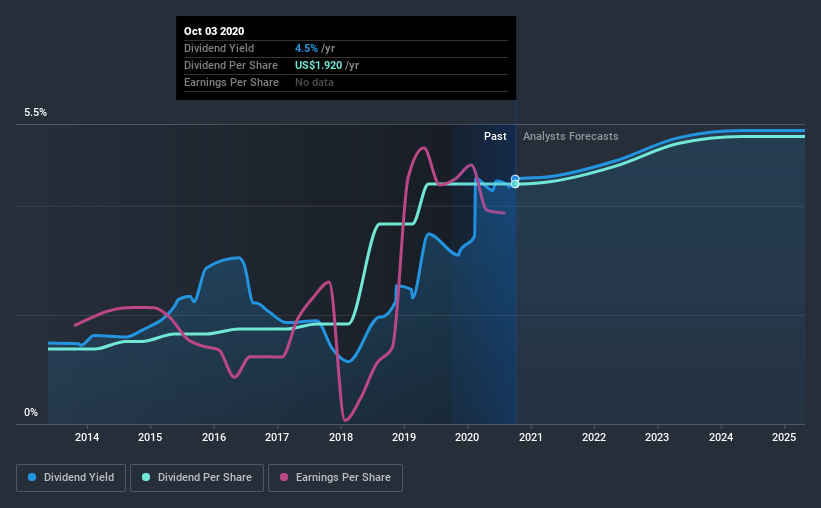NetApp, Inc. (NASDAQ:NTAP) Pays A US$0.48 Dividend In Just Four Days

NetApp, Inc. (NASDAQ:NTAP) stock is about to trade ex-dividend in four days. You will need to purchase shares before the 8th of October to receive the dividend, which will be paid on the 28th of October.
NetApp's next dividend payment will be US$0.48 per share. Last year, in total, the company distributed US$1.92 to shareholders. Calculating the last year's worth of payments shows that NetApp has a trailing yield of 4.5% on the current share price of $42.76. Dividends are a major contributor to investment returns for long term holders, but only if the dividend continues to be paid. That's why we should always check whether the dividend payments appear sustainable, and if the company is growing.
Check out our latest analysis for NetApp
Dividends are typically paid out of company income, so if a company pays out more than it earned, its dividend is usually at a higher risk of being cut. NetApp paid out more than half (55%) of its earnings last year, which is a regular payout ratio for most companies. Yet cash flows are even more important than profits for assessing a dividend, so we need to see if the company generated enough cash to pay its distribution. It paid out more than half (51%) of its free cash flow in the past year, which is within an average range for most companies.
It's encouraging to see that the dividend is covered by both profit and cash flow. This generally suggests the dividend is sustainable, as long as earnings don't drop precipitously.
Click here to see the company's payout ratio, plus analyst estimates of its future dividends.
Have Earnings And Dividends Been Growing?
Stocks in companies that generate sustainable earnings growth often make the best dividend prospects, as it is easier to lift the dividend when earnings are rising. If earnings fall far enough, the company could be forced to cut its dividend. For this reason, we're glad to see NetApp's earnings per share have risen 15% per annum over the last five years. NetApp has an average payout ratio which suggests a balance between growing earnings and rewarding shareholders. This is a reasonable combination that could hint at some further dividend increases in the future.
Another key way to measure a company's dividend prospects is by measuring its historical rate of dividend growth. Since the start of our data, seven years ago, NetApp has lifted its dividend by approximately 18% a year on average. It's exciting to see that both earnings and dividends per share have grown rapidly over the past few years.
To Sum It Up
From a dividend perspective, should investors buy or avoid NetApp? Higher earnings per share generally lead to higher dividends from dividend-paying stocks over the long run. That's why we're glad to see NetApp's earnings per share growing, although as we saw, the company is paying out more than half of its earnings and cashflow - 55% and 51% respectively. To summarise, NetApp looks okay on this analysis, although it doesn't appear a stand-out opportunity.
With that in mind, a critical part of thorough stock research is being aware of any risks that stock currently faces. Case in point: We've spotted 2 warning signs for NetApp you should be aware of.
A common investment mistake is buying the first interesting stock you see. Here you can find a list of promising dividend stocks with a greater than 2% yield and an upcoming dividend.
This article by Simply Wall St is general in nature. It does not constitute a recommendation to buy or sell any stock, and does not take account of your objectives, or your financial situation. We aim to bring you long-term focused analysis driven by fundamental data. Note that our analysis may not factor in the latest price-sensitive company announcements or qualitative material. Simply Wall St has no position in any stocks mentioned.
Have feedback on this article? Concerned about the content? Get in touch with us directly. Alternatively, email editorial-team@simplywallst.com.

